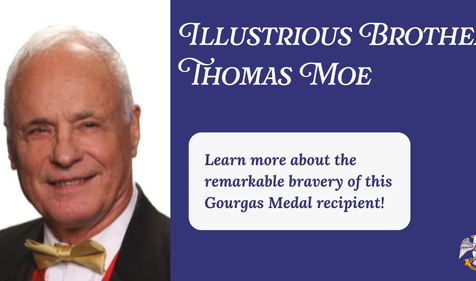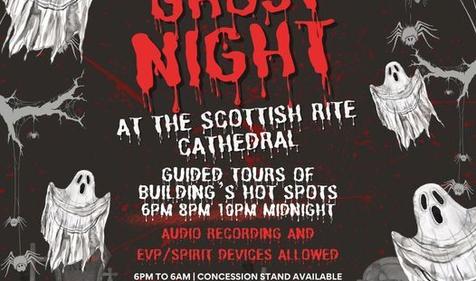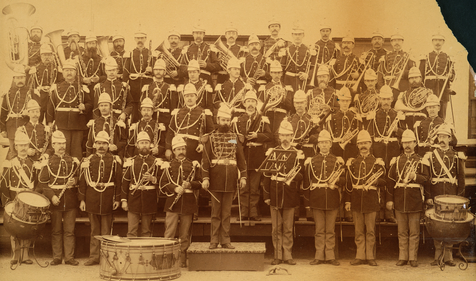Brother Thomas R. Labagh, 33°, reflects on his experience acting in the Scottish Rite 26th degree and the lessons he’s learned along the way.
This guest blog originally appeared in the November 2021 issue of The Northern Light. Written by Brother Thomas R. Labagh, 33°.
The virtues of our gentle Craft could not prevent war, but in time of dire need—in the face of death—the strained sinews of “the tie that binds” strengthened instead of snapped, and Brothers cared for Brothers without hesitation or disdain. In our politically torn country, no message could be more powerful to us: We must remain a Brotherhood undivided by party affiliation, worship customs, scientific knowledge, righteousness, ethnic background, or differing abilities. End of sermon. Instead, this article morphed into my own Scottish Rite story. I hope you find it worth reading, because it might be your story, too—now or in the future.
I have been an actor in the 26th degree since May of 1994, when I was cast by Brother Delvin L. Zeiders, 33°, Director of Work for the Valley of Harrisburg, to play Abraham Lincoln. I didn’t see myself as being anything like honest Abe, but if the director believed I could do it, I agreed to give it a try. But then, I didn’t see myself as Ben Franklin either. Two years earlier, I had been cast to play Young Ben in the first scene (long since removed from the text) of the 25th degree. In it, Ben faced a very stern and accusing Lodge Committee of Investigation. So, I wasn’t new to playing a historical character. Luckily, there was little factual information about Young Ben other than his own writings. In those, he didn’t describe his physical nature, mannerisms, or vocal qualities, and focused more on his ideas and beliefs, so I was free to make up the character based on my interpretation of the text.
Abraham Lincoln, however, brought a much greater responsibility. First, there were pictures, and I didn’t think I looked anything like him. Then, there were detailed descriptions of his voice when calm, when angry, when grieved, when nervous. He would even vary his pronunciation of certain words when he wanted to emphasize his backwoods upbringing: feller, heered and reckon. People wrote about his handshake, his furrowing eyebrows, his toothy smile, and the way he slapped his leg to emphasize a story he told. How much of this did I need to absorb to make the audience believe I was Abe Lincoln and not Tom Labagh reciting the Gettysburg Address in high school?
I read parts of several biographies to try to capture the essence of the man, and I feel as if I did an okay job, for the most part. Much credit for my acceptance as Lincoln goes to the make-up genius of our deceased Illustrious Brother Richard M. Gillardy who was tragically killed in an accident on the way home from receiving the 33rd degree in Washington, DC, in 2013. Occasionally, I was asked to appear as Lincoln at a school, a lodge, or a Scottish Rite Club as an entertainment program. Daniel Day- Lewis wasn’t worried about competition from me when he auditioned for Steven Spielberg’s masterful film. Improvisation was not my strong suit, but I got better at it over the years. I learned to do my own makeup and have tried to entertain, teach, and give people a feeling that perhaps they were seeing and hearing at least a part of this great man, President Abraham Lincoln.
When that degree script was retired in 2006, I was less into acting and more into the direction and production of degrees, so you can imagine my own surprise when I first saw the authentic costume for General George E. Pickett, Army of the Confederacy, and tried it on. At that moment, in my mind I knew I WAS George Pickett. I put on the boots with the spurs, the sash, the belt, the tie, and the kepi hat. I just knew I was born to play this character. I even bought an antique riding crop similar to the one Pickett carried with him when leading the troops. Again, I hit the books trying to learn even more about Pickett and the tragic charge attributed to him on the third and final day of the Battle of Gettysburg. I was consumed with getting his voice, brash attitude, bravado, and passion just right. I wanted to know what was really going on in his head the night before the battle, so I could convey THAT feeling when using the author’s words. I learned about his military schooling at West Point, his commissioned and breveted ranks, his combat experiences, his family life, the loss of two wives, a bi-racial child given up to others for care, his true feelings about what happened during “the charge,” and his reaction to the aftermath.
All of this research helped to inform my portrayal of General Pickett on stage, and later, in a banquet and lodge “edutainment” program. I do not go out in public in a uniform of the Confederacy, knowing that, to some, it is an offensive reminder of a shameful part of our American history. But I do not feel ashamed portraying this interesting and complex human being who claimed he detested the institution of slavery. I have also enjoyed a friendly rivalry/camaraderie with a neighboring General Pickett in New Jersey, and recently took my characterization on the road to pay tribute to MW Robert Monacelli, Grand Master of Masons in New Jersey, for a class named in his honor.
Because I took this approach to learn more about the historical characters I was asked to play, I have also felt the need to create a small “backstory” for each fictional character I portray. In each case, the additional research into the time, the culture, and the prevailing civilization has enhanced my understanding of the degrees (and the Core Values we present) and has enriched my personal Scottish Rite journey far beyond my expectations.
Related Stories
Discover additional Scottish Rite blogs and news on this topic.
-
Illustrious Brother Thomas N. Moe Awarded the Gourgas Medal for Exemplary Service to Freemasonry and Humanity
News
Read More about Illustrious Brother Thomas N. Moe Awarded the Gourgas Medal for Exemplary Service to Freemasonry and Humanity
-
Valley of New Castle Finds Non-Traditional Way to Raise Funds
Inspiration
Read More about Valley of New Castle Finds Non-Traditional Way to Raise Funds
-
The Marching Mason: John Philip Sousa
Inspiration
Read More about The Marching Mason: John Philip Sousa



